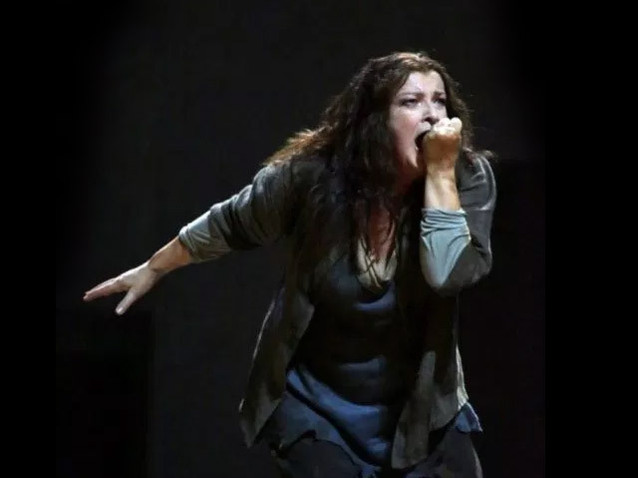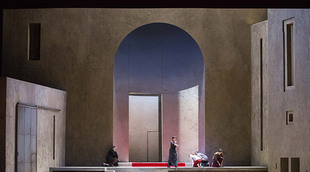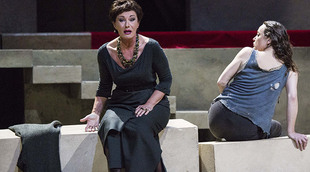 © Brescia/Amisano – Teatro alla Scala
© Brescia/Amisano – Teatro alla Scala
The sense of expectation that surrounded the return of Patrice Chéreau's production of Elektra to La Scala is testament to the artistry of the French director, arguably the greatest the nation has produced in the postwar period. Time and again, Chéreau's conceptions bore to the heart of the drama, and through an often startling simplicity of directorial means. The director's Elektra, his last production, opened in Aix in 2013 before travelling to La Scala. Now, the Milan house has revived the opera to mark five years since the director's death.
The production has lost none of its impact. Richard Peduzzi's colossal, essential sets comprise towering walls framing a hemispherical chancel and a wide platform raised like an altar. Little else is added to the mix. No props, no reconfigurations of the single set and very few directorial interventions. Simply a chasmal space, at once post-industrial and ancient Greek in feel, within which the characters are inevitably dwarfed. It is improbable that an atmosphere of claustrophobia should be generated in such an open area. But it is precisely a sense of claustrophobia that comes to dominate in this production. As a result, the work's cumulative psychological tension is pushed to breaking point.
How do Chéreau and Peter McClintock, the latter of which has been entrusted with reviving the original production, achieve such a feat? By treating the work simply and trusting Strauss's score to do the legwork of generating the composer's expressionistic vision on the one hand. By drawing excellent contributions from the cast on the other. Successful Elektras always depend on inspiring vocal performances. The way in which Chéreau's staging leaves singers exposed means strong contributions are especially key. Luckily, Ricarda Merbeth was on hand for the title role: her bright, weighty voice and razor sharp diction cut through dense orchestral textures, and the soprano powered through her music to vividly communicate an array of emotional states from bounding excitement to pulsing eroticism to stark despair. The restless, writhing Merbeth was a picture of turmoil and pent up rage. At key moments such as her opening account of the mariticide her voice built to a harrowing roar.
Regine Hangler as Chrysothemis had charisma to match. Hers is a voluptuous voice, here used to evoke a naive reading of the character which boldly contrasted with the dark Elektra. Waltraud Meier's rich mezzo has lost some of its sheen and was not always audible over the orchestra, but her artistry remains as vital as ever. When Klytämnestra confided in her daughter Elektra, with the latter ultimately threatening to sacrifice the former, Meier spun an eloquent and compelling psychological journey that traversed states of tenderness, anxiety and psychological meltdown. Michael Volle was a haunting Orest, a man traumatised by whatever he has seen beyond the confines of Mycenae, even before the culminating bloodbath had begun. The mass murder he orchestrates within the Palace clearly did not prove cathartic. At the conclusion, Volle exited the stage in a zombie-like trance, his glazed expression chillingly palpable even from the safety of our auditorium seats.
But no matter how good the singing, strong playing is also required if Elektra's full dramatic potential is to be realised. The reading of Christoph von Dohnányi, leading his first production since Moses and Aaron in 1977, was straightforward but powerful, and elicited a dense, polished sound that matched the set for monumentality. If playing could have sometimes been more sensuous, unstoppable thrust and momentum made for an exhilarating, "fasten-your-seatbelts" performance. Rarely does the Scala orchestra sound as robust as it did here. The anarchic sonic barrage that closes the work packed an almighty punch. This is devastating opera, and a fitting memorial to the great Chéreau.
James Imam
the 09 of November, 2018 | Print


Comments